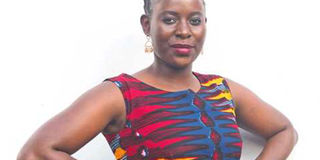Mshonaji uses African print to target high-end customers

Leah Otieno runs Mshonaji, an outfit that makes custom clothing for a niche market of men, women and children. PHOTO | FLORENCE BETT KINYATTI | NATION MEDIA GROUP
What you need to know:
Mshonaji custom makes clothes from Ankara, cotton, chiffon... the choice of fabric depends on the client’s design.
People mistakenly associate custom-made to Ankara. I seek to break this association.
I manage the operations in Mshonaji: I source for fabrics, curate designs and meet clients to take measurements.
My clients never have to meet the fundis or deal with their empty promises.
Leah Otieno and I are sitting in the terrace of Lava Latte. Lava Latte is what they describe as an afro-chic boho-styled eatery. It is on 209 State House Road, Nairobi. It sits in an abandoned primary school.
Sometimes, when you are out in the terrace having your chicken-avocado sandwich, you can hear the giggles of schoolchildren rustling the leaves in the trees. It is ethereal. Even the sun cannot help but come out to play.
CUSTOM-MAKE
Leah is one of the managing partners here. She is the one who will come over to your table to ask if you need a second helping of their panini. She also lent her style voice to the interiors – the Ankara fabric that drapes the bar and restaurant counters speak her language.
Leah runs a gig that hand-makes custom clothing for a niche market of men, women and children named Mshonaji. You will find her profile by the same name on Instagram, @mshonaji.
Leah shares her story:
“Most people don’t know that Ankara fabric is not originally African. The Dutch first manufactured it, then we adopted it and made it ours. Probably because the tribal patterns seemed very African. The West Africans embraced it before the rest of Africa did. Woodin and Vlisco are some of the recognised global manufacturers of real Dutch wax fabrics.
After high school, I got a fully paid scholarship to study economics at a university in Iowa, USA. My initial plan was to study biochemistry but how it works in the States is that you do liberal arts in your first year. We got a teacher in economics who simplified the concepts and related economics to everyday life. Even writing has an element of economics. I switched majors after her class.
I launched Mshonaji in March 2017. The vision for the business was to custom-make clothes for men, women and children. I also wanted to promote the local industry of fundis. I wanted to connect them to a class of clientele they do not regularly have access to. My clients would get quality items made by skilled local craftsmen.
My confidence as an entrepreneur and stylist has grown over the years. Now I can voice my opinions to my clients. It is what they pay for, after all. I am also not shy to charge them what I feel is the value of what they will get.
EMPTY NEST
Our turnaround production time is between seven to 10 days. I have the items delivered to our clients. It is part of our concierge service.
I relocated to Iowa when I was 18. I was there for six years, and returned in March 2016. I relocated when I was a young girl coming of age. I returned when I was 24, and had found myself – I understood how to translate my personal style into a fashion concept driven by our African culture.
Mshonaji custom makes clothes from Ankara, cotton, chiffon... the choice of fabric depends on the client’s design. People mistakenly associate custom-made to Ankara. I seek to break this association.
I did not realise how sheltered a teen I was until I relocated to Iowa. I grew up in a family of five in Kisumu County. My parents were both schoolteachers. I came to Nairobi when I was 11 to live with my aunt in her empty nest. My Dholuo accent by that time was gradually fading away, ha-ha. Iowa wiped it out completely.
I manage the operations in Mshonaji: I source for fabrics, curate designs and meet clients to take measurements. My clients never have to meet the fundis or deal with their empty promises.
I also give style consultation to my clients. Say, if a jumpsuit would not flatter her body type, I will suggest an alternative design. Or if the patterns on an Ankara fabric do not compliment a design, I will point this out.
QUALITY FABRICS
Our clients pay premium for a hassle-free experience. They pay for personalised style and quality fabrics. Fundis may sometimes ruin a wonderful design with the quality of fabrics they select. They buy cheap fabric so they can lower their costs. I nip this.
In 2026, I imagine my business will be producing my own designs for export. The brand would have created the need and appreciation to have more Kenyans consume our locally handcrafted custom designs.
I do not want to get into mass-market production because our value is from the custom made.
Kenya does not manufacture its own fabrics because we no longer grow cotton on a large scale. We have some fabric companies in Thika that do cotton blends for, say, shukas. What I think, though, is that there is no need to own the entire process. We can buy the fabrics from China but own the production process here in Kenya. I believe that’s sufficient for my brand.”




